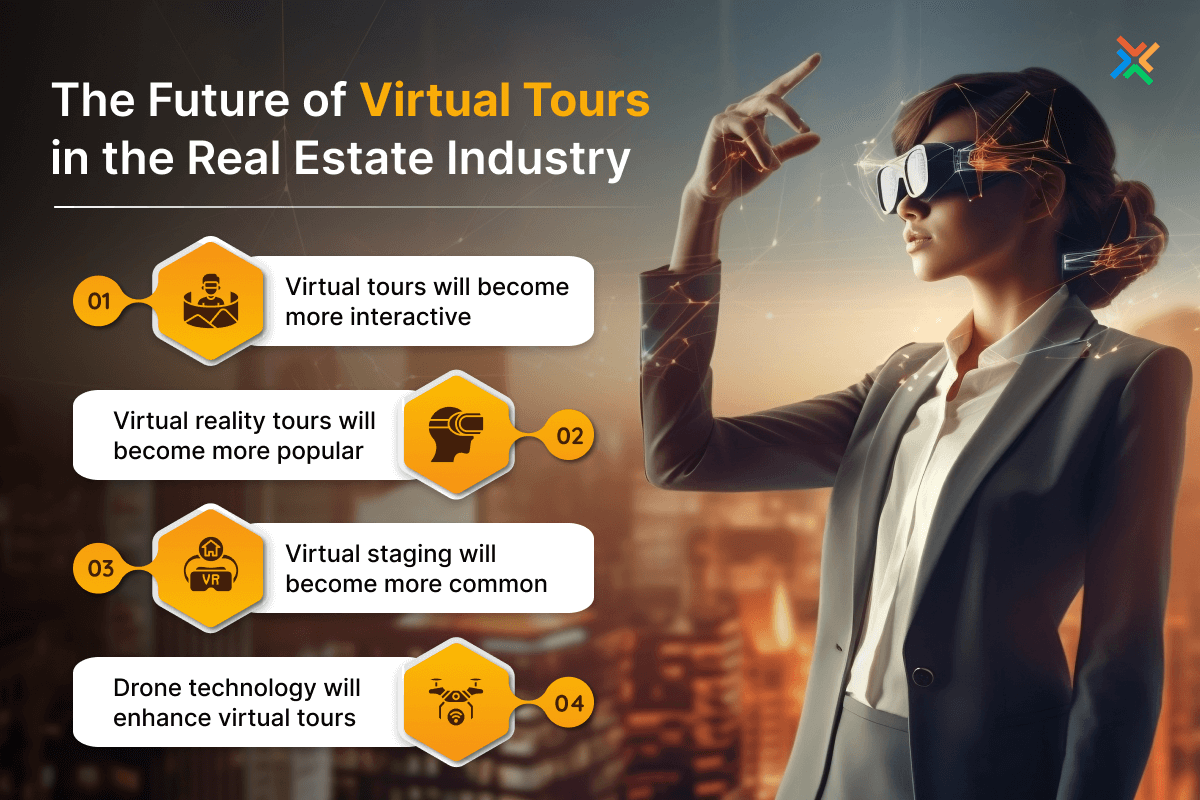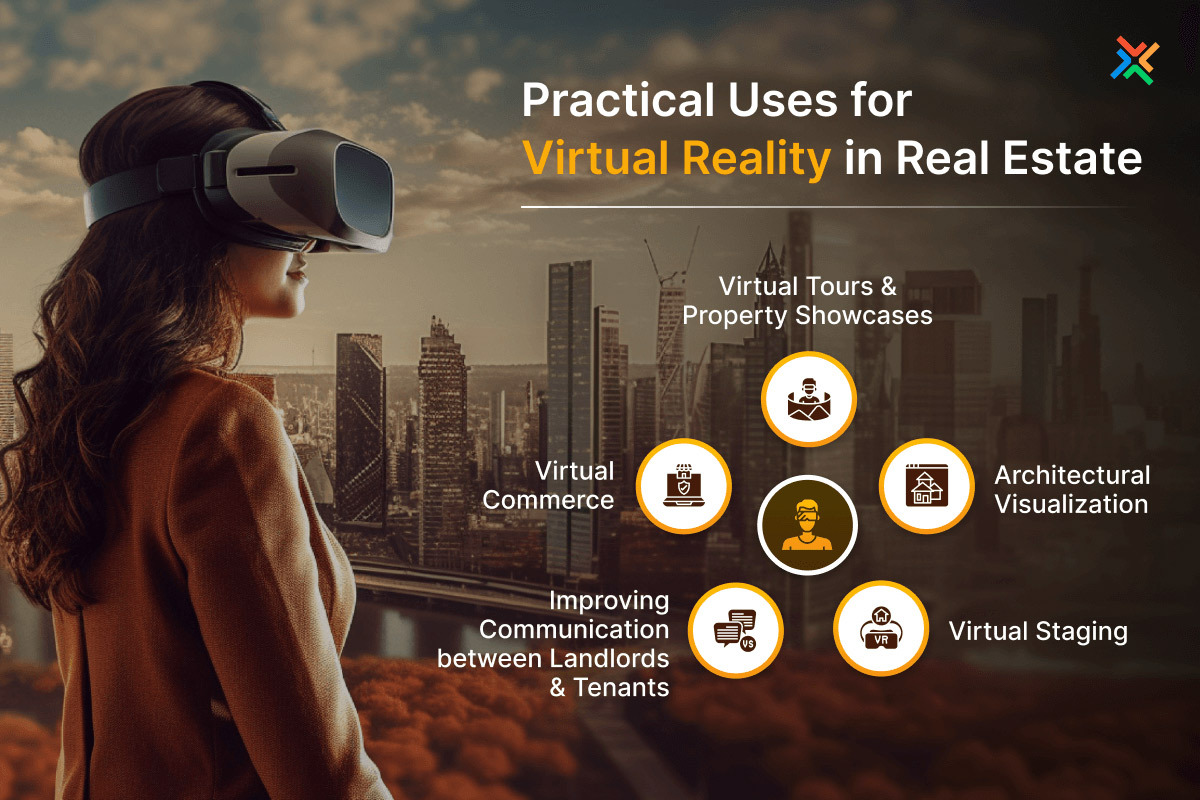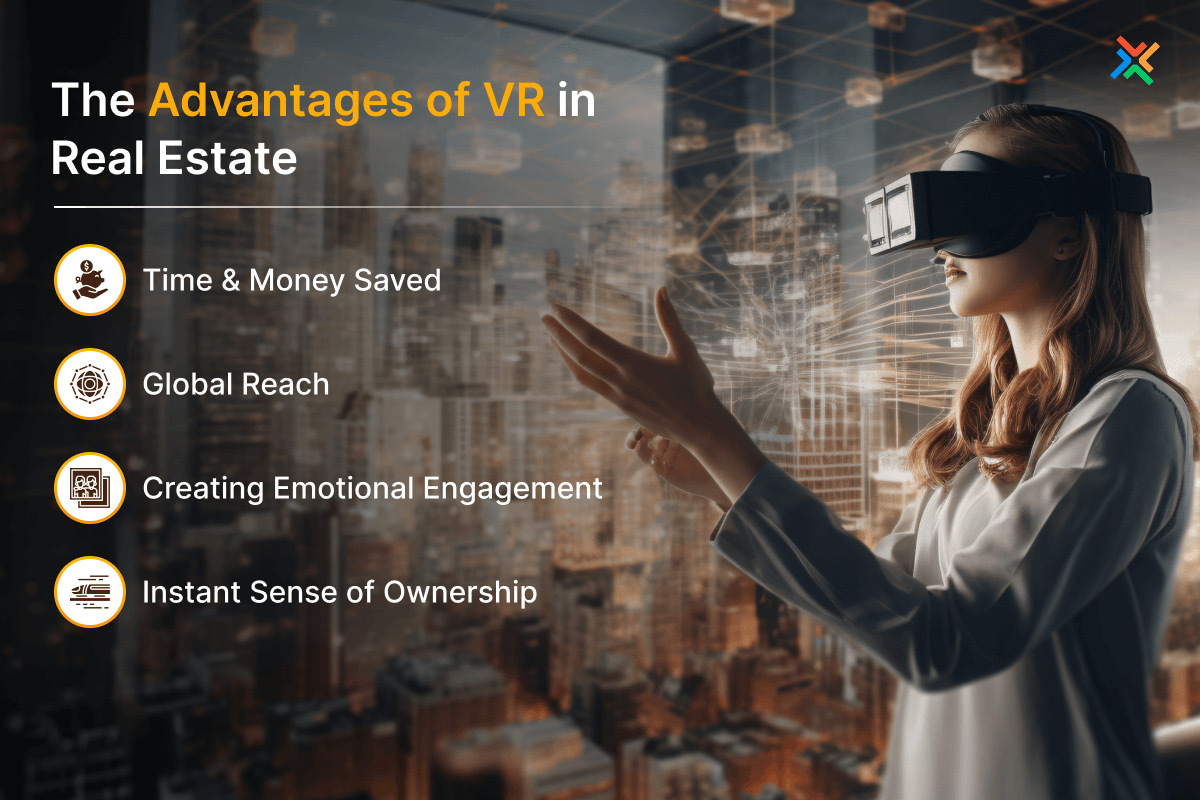Virtual Reality for Real Estate: Comprehensive Guide for 2024
March 30, 2024

Vivek Adatia
.png?w=1920&q=75)
Forget the days of countless open houses and rushed walkthroughs. The real estate scene is undergoing a significant transformation, driven by state-of-the-art Virtual Reality (VR) technology. VR creates a computer-generated simulation of a three-dimensional environment. By wearing a VR headset, users are transported into a virtual world, able to interact with and explore it as if they were physically present. They can examine a potential property from the comfort of their living room, teleport across continents to tour international listings, or even redecorate a space before making an offer.
According to a recent study by Grand View Research, Inc., a respected market research firm, the global VR in the real estate market is projected to balloon to a staggering USD 3.16 billion by 2025. This phenomenal growth signifies a surge in adoption, with VR rapidly becoming an indispensable tool for both buyers and sellers. With the continuous advancement in VR technology, it is set to redefine the way we experience properties, adding significantly to the efficiency, convenience, and personalization of real estate in Dubai and beyond.
Technical Aspects of VR in Real Estate
The essence of VR real estate tours lies in the intricate interplay between 3D scanning and modeling technologies, along with user-friendly VR platforms and headsets. Let’s dive into the nuts and bolts of this innovative system.

3D Scanning & Modeling
The first step involves capturing a meticulous digital replica of the property. This is achieved through 3D scanning, a process that utilizes specialized equipment to gather precise spatial data. Two common methods are employed.
Laser Scanning: A light-based radar paints the room with laser beams, recording every nook and cranny. This technology delivers highly accurate, detailed scans ideal for complex layouts.
Photogrammetry: This technique uses multiple high-resolution photographs taken from various angles. Specialized software then analyzes these images to create a 3D model, offering a cost-effective alternative for simpler spaces.
Once the scan is complete, 3D modeling software comes into play. This software transforms the raw data points into a visually compelling 3D model, adding textures, materials, and lighting to create a realistic representation of the property. This model forms the foundation of the immersive VR experience.
VR Platforms & Headsets
Popular platforms like Matterport and Virtual offer user-friendly interfaces to showcase these 3D models in an immersive format. These platforms allow users to navigate the virtual space, virtually "walk through" rooms, and even view dollhouse-style layouts for a holistic understanding of the property.
When it comes to VR headsets, the market offers a range of options. High-end models like the Oculus Quest Pro 2 offer exceptional resolution and powerful processing for a truly immersive experience. However, budget-friendly options like Google Cardboard utilize smartphones to create a more basic VR experience. Ultimately, the ideal choice depends on factors like desired features, user comfort, and budget. The key takeaway? User-friendliness reigns supreme. VR solutions should be intuitive and accessible to ensure an efficient and engaging experience for potential buyers.
How VR is Transforming Real Estate
VR development services in UAE transcend the limitations of traditional methods, revolutionizing the real estate space by offering a more immersive and engaging experience for both buyers and agents.

Remote Explorations
VR In the Real Estate Industry effectively overcomes geographical limitations. For instance, users can tour a vacation property in Hawaii or a potential investment opportunity across the country, all from the comfort of their couch. VR allows users to explore properties anywhere in the world at their convenience. This saves valuable time and resources compared to traditional in-person showings.
Hyper-Realistic Experiences
Static photos and videos often fail to capture the true essence of a property. VR provides a realistic sense of scale and flow. Users can virtually "walk through" rooms, gauging the dimensions and feeling the natural light. This immersive experience allows buyers to make a more informed decision about whether a property aligns with their needs and lifestyle.
Optimized Sales Process
VR can pre-qualify leads by allowing potential buyers to virtually tour properties before committing to physical visits. This saves time and resources for agents and sellers by focusing on truly interested buyers. Additionally, VR tours can be conducted anytime, eliminating the need to schedule appointments around busy schedules.
Global Marketing Reach
Real estate agents can leverage VR to showcase properties to a wider audience, attracting international clientele who might not be able to visit in person. This expands the pool of potential buyers and increases the chances of a successful sale.
Benefits of VR in Real Estate
The advantages of a VR app development company in UAE are not limited to just creating immersive experiences. Here's a breakdown of the benefits VR offers to various stakeholders in the real estate industry.

Potential Buyers
- VR nurtures a deeper connection with potential properties. Buyers can examine every detail, measure spaces, and get a realistic feel for the layout, leading to more informed decisions.
- Eliminates geographical constraints and explore properties across the globe at your convenience.
- Helps visualize the property's full potential with stylish furniture and décor, helping you imagine your dream home.
- Lets you experiment with different furniture arrangements, paint colors, and finishes to personalize the virtual space to your unique preferences.
Real Estate Agents
- Optimizes workflows by conducting remote presentations and hosting virtual open houses, saving valuable time and resources.
- Attracts a wider audience of global buyers, expanding your reach and boosting your competitiveness.
- Helps showcase properties in a captivating and innovative way, setting yourself apart from the competition.
- Reduces costs associated with physical staging and travel for in-person showings.
Property Developers
- Creates architectural visualizations to showcase unbuilt properties, attracting potential buyers early in the development phase.
- VR experiences can provide valuable insights into user preferences and spatial interactions, informing future design decisions.
- Helps generate excitement and pre-sell properties based on immersive VR experiences, accelerating sales cycles.
The Future of VR in Real Estate (2024 and Beyond)
The VR revolution in real estate is just getting started. As technology matures, we can expect even more immersive and interactive experiences that further transform the industry.
Emerging Technologies
The next wave of VR advancements promises to blur the lines between the virtual and physical worlds. For instance, through haptic feedback technology, potential buyers may even be able to feel the plush texture of a carpet beneath their virtual feet or the coolness of a granite countertop. By incorporating touch sensations, VR experiences will become even more realistic and emotionally engaging.
Furthermore, the integration of Artificial Intelligence (AI) with VR software development holds immense potential. AI-powered virtual tours could become automated, allowing users to explore properties at their own pace with personalized recommendations based on their preferences. A VR tour in the future could highlight features specific to your interests, whether it's highlighting ample storage space for a growing family or showcasing smart home features for tech enthusiasts.
Accessibility & Affordability
One of the key challenges to widespread VR adoption is accessibility. However, the future looks promising. As VR technology matures, we can expect a decrease in hardware costs, making VR solutions more affordable for a wider range of real estate agents and potential buyers. Additionally, the rise of cloud-based VR solutions could eliminate the need for expensive headsets. By streaming VR experiences directly to mobile devices or affordable VR glasses, the technology becomes more accessible to a broader audience.
This increased accessibility will not only allow more potential buyers to explore properties virtually but also help real estate agents leverage VR as a standard marketing tool. The future of VR in real estate is brimming with possibilities, facilitating a more efficient, convenient, and personalized experience for all stakeholders.
VR - Your Key to Success in the Real Estate Industry
The real estate industry thrives on connection. Its essence lies in matching aspirations with properties, building a bridge between dreams and reality. The future of VR in real estate is not just about fancy headsets and immersive experiences. It's about forging a deeper, more meaningful connection between people and places.
This technology isn't a fad; it's a fundamental shift. It's the virtual key that unlocks a bundle of opportunities – for agents to expand their reach, for developers to ignite buyer interest early on, and for buyers to discover their dream property with confidence. As top VR companies & AR companies in UAE evolve, so too will the possibilities. The future of real estate is not just virtual, it's vibrant, it's accessible, and it's waiting to be explored. Are you ready to unlock the door?
Power up your real estate business with cutting-edge VR tech
VR-powered virtual tours are the future of the real estate industry. At WDCS, we can help you harness this technology for your business and help you stay a step ahead of the competition.